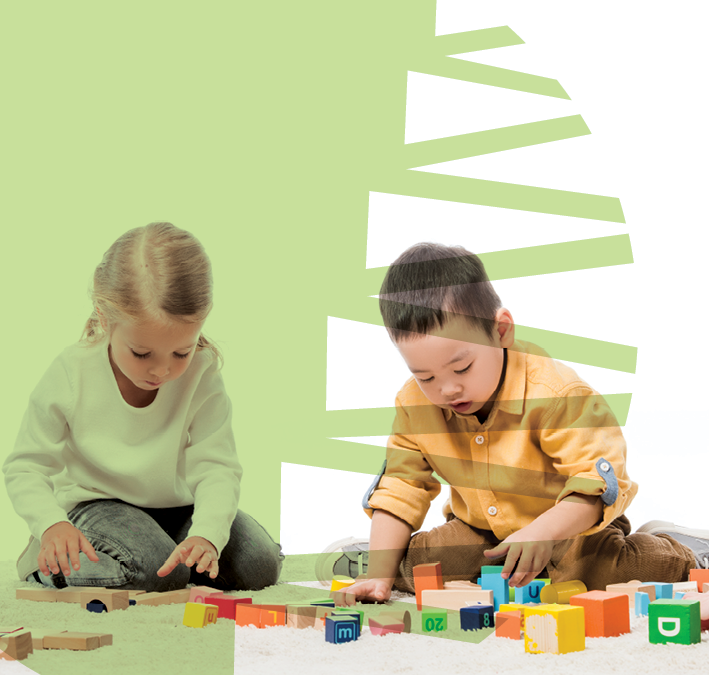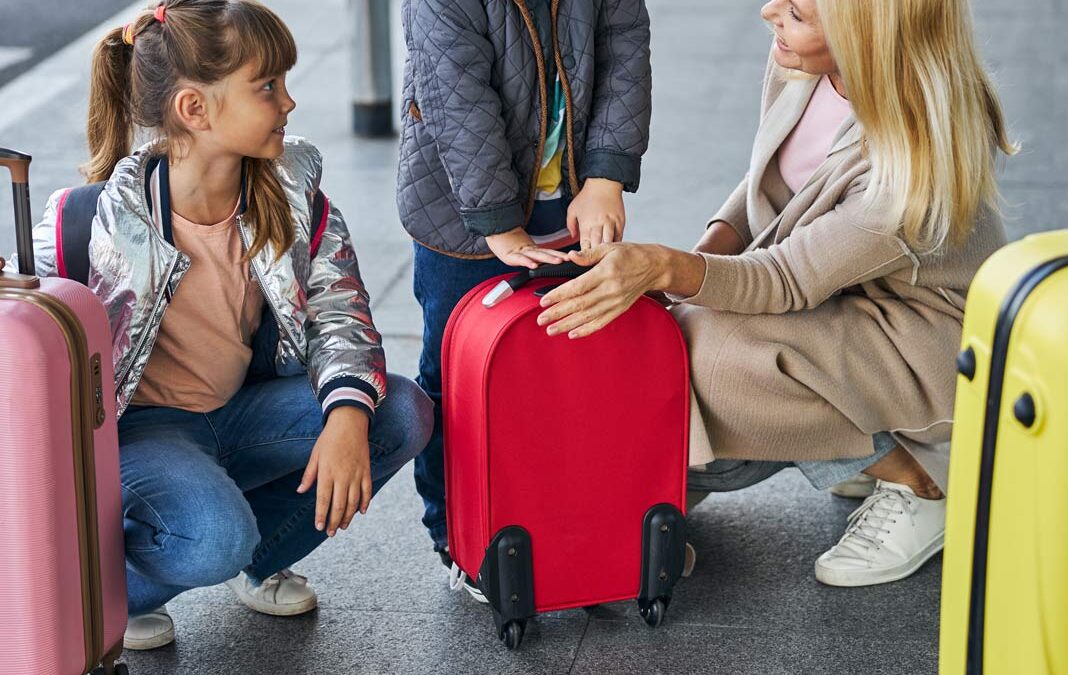
by IABA Team | Oct 31, 2022
Autism has traditionally been diagnosed more frequently in males, but new studies have shown that autism may have nothing to do with sex. The lower prevalence of autism in girls may be due to specific behaviors that indicate autism going unnoticed.
The signs and symptoms of autism do not differ between boys & girls. The way some signs and symptoms of autism can be shown through behaviors, however, can differ.
General Signs of Autism
Before looking at how behaviors that potentially indicate autism may differ between boys and girls, let’s look at some of the general signs of ASD. Signs of general autism normally include:
- Social behavior issues
- Communication issues
- Problems understanding relationships
- A very narrow set of interests and areas of focus
- Stimming (repetitive motor actions and/or sounds)
- Difficulty adapting to change
- Extreme reactions to sensory stimuli
Signs of Autism in Boys
The reason autism diagnoses have been observed at higher levels in boys is that the behaviors most people associate with autism frequently appear in young boys. These signs include:
- Repetitive Actions & Play. Boys with autism are more likely than girls to engage in extremely limited and repetitive actions & play.
- Narrow Fields of Interest. Fields of interest including mechanical or data-driven topics often appeal much more to boys with autism than girls.
- Aggression. Aggression related to autism manifests much more often in boys than in girls.
- Social Unawareness. Boys with autism seem more socially ‘awkward’ than girls with ASD. Younger boys with autism often seem socially withdrawn and uninterested, unlike a larger number of young girls with autism.
Please note that signs of autism can differ greatly from person to person. Some of the signs listed in both of these lists can surface in both boys and girls. These lists are simply to show signs that occur more often when diagnosing autism in young girls & boys.
Signs of Autism in Girls
Some of the criteria used to diagnose autism may go unnoticed by parents or teachers when it comes to girls. These signs can manifest in different ways. Some of the signs of autism that girls exhibit more than boys include:
- Introversion. Girls with autism may be more introverted or be considered to be ‘shy’ than boys. While being introverted doesn’t necessarily mean a girl has autism, being severely introverted may be a warning sign.
- Hyper focusing. Hyper focusing is, broadly speaking, complete absorption into a task. In girls with autism, hyperfocus totally prevents them from dividing attention between more than one thing.
- Lack of social awareness. Another sign that a young girl may have autism is a lack of social awareness. This manifests itself in a girl being unable to establish the relevance or importance of others, leading to a lack of understanding social cues.
- Auditory/Sensory Processing. Severe auditory and other sensory processing sensitivities or issues may also be a sign of autism. This is different than being scared of alarmed due to loud or explosive sounds and more about issues with sounds or sensory stimuli most people take no issue with.
- Social Camouflaging. Social camouflaging can be the most difficult sign of autism in young girls for parents to detect. Young girls with mild autism may go undiagnosed due to seeming socially neurotypical. This makes looking for other signs even more important.
ABA Therapy from IABA Consultants
If you have questions regarding autism treatment, education, or plans to use ABA therapy, we are here for you! Our goal is to make sure no family is turned away due to financial constraints. Our therapy team would love to talk to you. Find the location closest to you and give us a call. We’re here for you.

by IABA Team | Oct 24, 2022
Autism has traditionally been diagnosed more frequently in males, but new studies have shown that autism may have nothing to do with sex. The lower prevalence of autism in girls may be due to specific behaviors that indicate autism going unnoticed.
Let’s take a look at why autism in girls is often overlooked and what those signs are.
Girls & Autism
Why have many signs of autism in girls been overlooked for so long? The short answer is behavioral patterns. While the criteria used to diagnose autism are not different for boys and girls, the way the signs appear may be different.
Signs of general autism normally include:
- Social behavior issues
- Communication issues
- Problems understanding relationships
- A very narrow set of interests and areas of focus
- Stimming (repetitive motor actions and/or sounds)
- Difficulty adapting to change
- Extreme reactions to sensory stimuli
This list is very general and non-specific, but they are related to the criteria used to diagnose autism. The behaviors that show some of these issues, however, can be different for boys & girls.
Signs of Autism in Girls
Some of the criteria used to diagnose autism may go unnoticed by parents or teachers when it comes to girls. These signs can manifest in different ways. Some of the signs of autism that girls exhibit more than boys include:
- Introversion. Girls with autism may be more introverted or be considered to be ‘shy’ than boys. While being introverted doesn’t necessarily mean a girl has autism, being severely introverted may be a warning sign.
- Hyper focusing. Hyper focusing is, broadly speaking, complete absorption into a task. In girls with autism, hyperfocus totally prevents them from dividing attention between more than one thing.
- Lack of social awareness. Another sign that a young girl may have autism is a lack of social awareness. This manifests itself in a girl being unable to establish the relevance or importance of others, leading to a lack of understanding social cues.
- Auditory/Sensory Processing. Severe auditory and other sensory processing sensitivities or issues may also be a sign of autism. This is different than being scared of alarmed due to loud or explosive sounds and more about issues with sounds or sensory stimuli most people take no issue with.
- Social Camouflaging. Social camouflaging can be the most difficult sign of autism in young girls for parents to detect. Young girls with mild autism may go undiagnosed due to seeming socially neurotypical. This makes looking for other signs even more important.
What To Do
If you notice any regular occurrences of irregular behavior, you may want to check in with your child’s pediatrician. A single behavioral issue is usually not enough to seek a medical opinion, but frequent irregular episodes could indicate an evaluation.
Seeking professional medical help is the only way to truly get a proper diagnosis.
ABA Therapy from IABA Consultants
If you have questions regarding autism treatment, education, or plans to use ABA therapy, we are here for you! Our goal is to make sure no family is turned away due to financial constraints. Our therapy team would love to talk to you. Find the location closest to you and give us a call. We’re here for you.

by Jessie Cooper | Sep 1, 2022
Growing up my grandparents lived on a farm in northeast Ohio about an hour from my parent’s home. During my childhood, the farm was my happy place for so many years. As a child fitting in was not my strong suit and I didn’t have the wisdom I possess now that fitting in is never the goal; belonging to our own hearts is. Whenever we visited my grandparents I felt at peace against the chaos of the world. I suppose I knew a little about belonging because on the farm I felt it.
As a child every summer my parents would take us for a week to learn and live with my grandparents. My grandma Virginia was a beautiful quilter and wanted to teach all her grandchildren to sew. Kristen, my sister, took to this quickly and to this day has a quilt rack in her office. Me? I am perfectly capable of sewing (thanks grandma) and it literally makes my stomach sick to focus on details that small. To this day I also still take my sister my mending pile.
Country Living
To escape the task of sewing I trotted at the boots of my grandpa Bob and did whatever chores he was doing. Each morning before the sun would rise we would get up and put on our “shit” boots then head down to the barn. I would pull the hose bringing water to the chickens, pigs, sheep, cows, goats, ducks, and my favorite; the cats. We would scoop food together, muck out stalls and make sure all the animals were ready for their day. After our early morning activities, my grandpa would pour me a bowl of cereal, slap it onto a metal tray, and we would watch whatever farming show was on in the morning on the shaggy carpet of their living room. Throughout the day I would drag buckets of water to my grandpa as he planted and by night we would rock on their porch swing eating popsicles made from my grandma’s grapevine.
I was in love with this life. Walking through the fields, watching the animals, nursing bottle-fed sheep in the morning, and kicking off my very important shit boots right alongside my grandpa. There was never a moment when there wasn’t something the earth needed or wanted. My grandma told me on a farm that the work is never done, it is waiting for its keeper. When summer ended we would visit the farm about twice a year to see my aunts, uncles, and cousins. Traditions of their own came with the holidays and gathering with my family, while different from me, filled me with quiet gratitude.
In the spring of 2020, my marriage was at a critical juncture and at the same time the world shut down for 12 weeks. I was at home terrified daily for my business in the first days of the pandemic and I knew in my heart that something had to change in my life. I had spent the last decade in Illinois building my business, making friendships that will last a lifetime, and becoming a mama to three beautiful boys. At the time I didn’t know my marriage would end but I did know I needed a happy place and missed my family dearly. I then did something that to this day I don’t know if it came from wisdom or fear. I bought a three-acre farm in Johnstown Ohio sight unseen in 24 hours. My children and I moved to the farm in August of 2020 and within a month I separated from my ex-husband.
Re-Discovering Life in the Country
The past two years have been nothing short of painful but they have also brought me incredible joy. I am a woman who always has to know why and to this day I’m not really sure why I’m here in Johnstown or bought the farm. The only thing I can settle into is this is our healing house. The family who built this house put such love, care, and detail into the home. Each room of the home has a detail that reminds me of beauty and each acre of the land has something new to explore. When I bought the home, I slid open their junk drawer to find a piece of paper to say thank you. Instead, I found this, “Have the Heart of A Shepherd and the Spirit of a Warrior.” It felt like my soul’s mantra and is now on a painting in my office. This home has wisdom I do not yet carry.
When I bought the farm I thought I could replicate the farm my grandparents made for our family. I imagined the 4th of July with my cousins, weekends with my aunts and uncles, and a deep gathering of family members. When I left my marriage some of my extended family turned on me claiming I was either lying about the reasons I was leaving my marriage or breaking God’s plan to follow the man in my marriage. The rest of my extended family either went silent or attacked my beautiful father for supporting his daughter.
It wasn’t the loss of my marriage that broke my heart, it was the loss of my family. It wasn’t until what felt like betrayal and grief passed that I realized I couldn’t lose what I never had. I accepted that I loved my family and they did not love me in return and that was OK. This allowed me to choose the family I deserve versus being hurt by the family I was born into. I know I’m more than the pain they attempted to bring to me and still attempt to bring by spending time with my ex-husband spinning hateful stories about me and my dad.
Farm Introspection
On the farm, I’ve learned a great many things about myself, how to be present, and how to love what is right in front of me. I have also learned that one week in the summer does not in fact give the skill sets you need to actually run a farm. Turns out I really dislike vegetable gardens, have killed my darling black raspberries, and at five Henry has a better green thumb than me with his pumpkin patch and sunflowers. It also turns out that finding time to add any animals to the farm feels like a task I’ll never have time for but something my soul is still curious for. Baby steps. This fall I’m going to take horseback riding lessons and actually take Simon, my boxer, back to obedience school instead of buying a puppy. The farm has after all taught me to pay attention to what is right in front of me.
Each day I try to find a piece of time to care for the land or the home. Some days I fail at this and some days I remember. But like my grandma said, my farm is always waiting for its keeper. Life is not what I expected it to be when I moved in night from Illinois to Ohio. There are days I still doubt where I am, what I’m doing, and if I’m making the right choices for my children. In those moments I smile gently to my soul reminding myself to bloom where I am planted
Xoxo,
Jessie Cooper

by IABA Team | Jul 5, 2022
Long trips and vacations with kids can be difficult. Keeping a child occupied and calm during a trip requires patience and preparation. Keeping a child with autism occupied and calm during a trip may require some extra patience and planning.
This article is going to go over tips, tricks, and good general information on traveling with an autistic child. The two sections in this article will include information on road trips and air travel, as both have unique challenges.
Tips for Flying with a Child with Autism
Air travel is a big change for any child with autism. The sensory overload that accompanies every flight can be a huge challenge. The noise, the pressure, the small area, and the regimented process are all obstacles that a family will need to prepare for before a flight.
Before flying with an autistic child, you will want to consider taking the following actions:
- Prepare Weeks (or Months, if possible) Ahead. Talk with your child’s therapist or doctor about how to best start the process of preparing for a flight. Getting a plan together early on will help remind you about things you may need to prepare your child for.
- Create a Calendar. Having a visual indicator for your child to see indicating the upcoming trip can help them prepare for the change.
- Talk to Your Child About the Flight. Go over all the information about planes, airports, and travel you have planned with your child before the trip. Ask your child questions about the trip and make sure they have an understanding of the upcoming trip.
- Pack Essentials. Make sure to pack any of your child’s favorite toys, activities, and snacks before the flight. Remember that liquids over 3oz. cannot be brought through airport security!
- Pack Entertainment. Make sure your child has their favorite long-term toy or activity-packed. Focusing on something they love can make the long trip seem much shorter.
- If Your Child Has Special Needs: Talk to the Airline or Airport Before Your Flight. If your child needs special treatment or has other needs not normally provided or permitted by airlines, make sure to call them as early as possible! Airlines can be very accommodating, so make sure to talk to your airline about any and all of your child’s needs.
- Do a Practice Airport/Airline Security Run. Talk to your child’s therapist or pediatrician about the best ways to simulate an airport or airport security. Devise a plan and make sure your child is as prepared as they can before the real thing.
Road Trips & Autism
Taking a trip or going on a car vacation is much easier than flying for a child with autism. This doesn’t, however, mean it will be a walk in the park!
Leaving home and routine behind is difficult for children. Taking a child with autism out of an expected routine and schedule will take some preparation to mitigate emotions.
Just like with flying, there are some things you can do prior to a road trip to help ease the apprehensions of your child:
- Create a Calendar. Giving your child a visual indicator for when they will leave home can help them understand when the trip will start.
- Talk to Your Child & Communicate the Trip Plans. Creating an understandable narrative around where & why you are traveling can help your child understand what is happening. Ask them questions about the trip, answer their questions about the trip, and be sure to emphasize the things they will enjoy!
- Have Your Child Help Prepare for the Trip. Helping mom or dad is always fun, especially when it’s for something special. Having your child help you with packing or preparing the car for the road trip may be a great way to imbue an understanding of what to expect.
- Show Pictures of Hotels or Houses You’re Staying At. Make sure to familiarize your child with your destination and what they can expect when you get there. If you are staying with relatives, contacting them to prepare a room, followed by sending pictures of the prepared space, can make your child understand where they are staying is safe.
- Pack the Essentials. This is imperative for any road trip–a car has fewer accommodations than a plane, namely, there are no snacks & no bathrooms. Be sure to pack all of your child’s favorite toys and activities along with a cooler filled with favorite snacks & drinks.
- Schedule Gas Station/Rest Area Stops. Letting your child know when you will be stopping can help them understand the length of the trip. Creating a visual calendar of stopping times/points can help even more.
Make sure to make your car as comfortable as possible for any road trip. Bringing favorite comfy blankets or pillows can help your child feel more at home in the car.
ABA Therapy from IABA Consultants
If you have questions regarding autism treatment, education, or plans to use ABA therapy, we are here for you! Our goal is to make sure no family is turned away due to financial constraints. Our therapy team would love to talk to you. Find the location closest to you and give us a call. We’re here for you.

by IABA Team | May 23, 2022
School is almost out for summer. This doesn’t mean that your child will need to be at home all summer. There are many summer programs, activities, and events that are designed for children with autism in mind.
Before looking at fun activities and programs, however, be sure to talk with your child’s therapist. They may have some great summer programs that could be a great option.
Summer School and Therapy
Many autism and ASD programs don’t follow a typical school schedule. If your child attends a school or clinic that offers year-round care and therapy, see what they offer.
Before signing up for any summer school or therapy plans, however, you may want to ask a few questions:
- Will my child have the same instructor or teacher?
- Are the hours the same?
- What differences are there between summer & school year programs?
- Is the program the same?
- Is the provider (both for teachers & insurance) the same?
Of course, these questions may not be necessary if your child attends a year-round school or clinic. Always be sure that year-round schools offer the same services in summer–changes could lead to some behavioral hiccups.
Events & Festivals
We’ll preface this by saying that larger events are not for every child with autism. Big crowds and big noises can lead to sensory discomfort that could easily be avoided by not attending specific events (like music festivals or sporting events).
With that said, there are tons of events that go on locally every summer. Things like:
- Farmer’s markets
- Arts & crafts events
- Outdoor sales
- Certain areas or events at county fairs
Be sure that your child is OK with any expected noises or other sensory overloads that could be present at a given event. If you are unsure what an event entails or how big the expected crowd is, call the event organizer. Some events may have safe areas or activities specifically designed for children with autism.
Fun Summer Activities at Home
Of course, you can always set up some great summer activities for your child in their favorite comfort zone–home. If you child shows interest in specific types of activities, the following list may get you started towards creating some amazing activities:
- Camping (not necessarily overnight–tents and sleeping bags are fun any time)
- “Pool” days (inflatable pools, sprinklers, etc)
- Picnic days (help with packing the picnic and eating in the yard)
- Art activity days (coloring, painting, chalk, play-doh, etc)
- Rainy day reading or movies (snacks & entertainment)
These activities are just the tip of the iceberg. If your child has interests or loves activities that aren’t on this chart… find a way to incorporate them into their summer schedule!
ABA Therapy from IABA Consultants
If you have questions regarding autism treatment, education, or plans to use ABA therapy, we are here for you! Our goal is to make sure no family is turned away due to financial constraints. Our therapy team would love to talk to you. Find the location closest to you and give us a call. We’re here for you.






